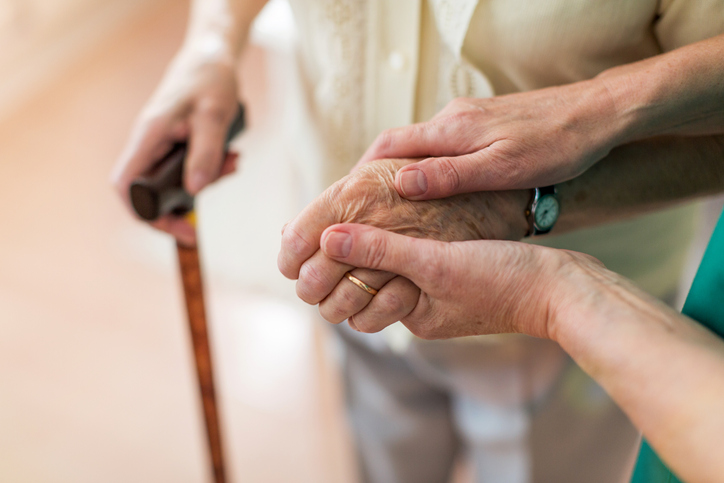Port St. Lucie Nursing Home Abuse Lawyer
If you suspect that your loved one is being abused in a nursing home or assisted living facility, take action as soon as possible. The longer you wait to address the problem, the more difficult it will be for your loved one to recover from the trauma they may have suffered at the hands of their abuser. A Port St Lucie nursing home abuse lawyer from Lytal, Reiter, Smith, Ivey & Fronrath can help. We’ll handle all of the paperwork and negotiations with the insurance companies so you can focus on what’s most important – your loved one’s recovery. Book a free consultation with a Port St Lucie personal injury lawyer right away.
Nursing Home Abuse and Neglect Claims We Handle
 Lytal, Reiter, Smith, Ivey & Fronrath handles a wide range of nursing home abuse and neglect claims, including:
Lytal, Reiter, Smith, Ivey & Fronrath handles a wide range of nursing home abuse and neglect claims, including:
- Physical abuse
- Sexual abuse
- Emotional abuse
- Neglect
- Financial exploitation
If you believe that your loved one has suffered any of these types of abuse or neglect, we can help.
A nursing home abuse lawyer will help you get the evidence you need to prove that your loved one was a victim of abuse. They will also help you negotiate with the insurance company to get the compensation you deserve.
How soon will I need to file a nursing home abuse lawsuit?
In Florida, you have two years to file a nursing home abuse lawsuit. The clock begins ticking when the last known occasion of abuse occurs.
It is important to begin your claim as soon as possible while the evidence is fresh. Paperwork disappears, and memories fade with time.
If you have any questions about nursing home abuse or the statute of limitations in Florida, please contact our office at (561) 655-1990. We would be happy to answer them.
How Can our Port St. Lucie Nursing Home Abuse Lawyer Help You?
Handling a nursing home abuse claim on your own is tough. The average person isn’t prepared to go up against a care facility’s parent corporation or administrator, let alone their insurance provider or teams of lawyers.
Our lawyers will collect medical records, eyewitness testimony, and video or photographic evidence. We’ll also ensure that paperwork is filed promptly and that your claim has the best chance of success.
Ultimately, our goal is to get the compensation you deserve from the abuser’s insurance company. We’ve won billions of dollars for clients by not backing down. Let us pursue compensations for physical and emotional injuries, pain and suffering, and loss of consortium.
How do I know if my loved one suffers from nursing home abuse or neglect?
If you are concerned that your loved one may be a victim of nursing home abuse or neglect, look for some common symptoms, including:
- Unexplained bruises or injuries
- Bedsores or other skin problems
- Weight loss or malnutrition
- Depression, agitation, or withdrawal
- Poor hygiene or unclean living conditions
- Frequent reports of falls and fall injuries
If you notice any of these signs, contact a lawyer right away. The lawyers at Lytal, Reiter, Smith, Ivey & Fronrath can help you obtain and preserve evidence and hold the abuser responsible. Call (561) 655-1990 now.
How are nursing homes regulated in Florida?
In Florida, nursing homes are regulated by the Agency for Health Care Administration (AHCA). AHCA is responsible for licensing and inspecting nursing homes and ensuring that they meet state and federal regulations.
If you have a complaint about a nursing home, you can file a complaint with AHCA. You can also contact the Long-Term Care Ombudsman Program, which is a program run by the state of Florida to protect the rights of residents in long-term care facilities.
These regulators play an important role in ensuring that nursing homes are held accountable. They investigate complaints from residents and their families and can help you take action to protect the residents’ rights.
What are the types of nursing home abuse?
Physical
Nursing home abuse can take many different forms, but physical abuse is perhaps the most shocking and egregious. It can involve slapping, punching, kicking, or even beating a resident with an object.
Warning signs of physical abuse include:
- Unexplained bruises, welts, or scars
- Bedsores or other skin problems
- Broken bones, sprains, or dislocations
- Mysterious injuries that are not consistent with the explanation given
Emotional
If you suspect that your loved one is being emotionally abused, you need to take action right away.
Warning signs of emotional abuse include:
- Frequent mood swings or changes in behavior
- Withdrawal from friends and family members
- Depression, anxiety, or agitation
- Unclean living conditions
- Physical neglect
- Emotional neglect
Types of emotional abuse include:
- Yelling
- Cursing
- Intimidation
- Humiliation
- Isolating from friends and family members
- Depression, anxiety, or agitation
- Unclean living conditions
- Physical neglect
Sexual
Sexual abuse can involve unwanted touching, sexual assault, or rape. This type of abuse is emotionally traumatizing for the victim and can include physical injuries.
Warning signs of sexual abuse include:
- Unexplained bruises or scratches
- Bedsores in the genital area
- Sexually transmitted diseases
- Fear of being touched
If you suspect that your loved one is a victim of sexual abuse, don’t hesitate to get in touch with the police and a lawyer right away.
Financial
This type of abuse can leave a victim with few resources to get help. If you suspect that your loved one is a victim of financial abuse, you should contact a lawyer right away.
Warning signs of financial abuse include:
- Unexplained withdrawals from bank accounts
- Missing money or possessions
- Signing over assets without knowing what they are signing
- Unpaid bills or overdue rent
- Neglecting to pay for the resident’s care
Types of financial abuse include:
- Stealing money or possessions
- Forcing the resident to sign over assets
- Neglecting to pay for the resident’s care
Healthcare Fraud
This type of abuse can be very costly for the victim, and it can also lead to higher healthcare costs for everyone.
Types of healthcare fraud include:
- Billing for services that were not provided
- Overcharging for services
- Falsifying records
- Providing unnecessary treatments
If you suspect that your loved one is a victim of healthcare fraud, please get in touch with a lawyer right away.
Conditions That May Worsen Elder Abuse
Alzheimer’s and Dementia
Alzheimer’s disease is a type of dementia in which brain cells degenerate and die at an accelerated rate.
This leads to memory loss, confusion, personality changes, and difficulty with everyday activities. As the disease progresses, it can cause more serious problems, such as difficulty walking or swallowing.
Dementia can also lead to a greater risk of elder abuse, as the residents may not be able to communicate what is happening to them.
Social Isolation
One of the biggest risk factors for elder abuse is social isolation.
When an elder is isolated from friends and family members, they are more likely to fall victim to financial or emotional abuse. They may also be less likely to report the abuse, as they may feel ashamed or embarrassed.
History of Abuse
Some seniors have a history of being abused, neglected, or mistreated throughout childhood and/or adulthood.
This type of treatment may be normal for them, but it does not make it excusable.
If you have a loved one who is at risk for elder abuse, please keep an eye on them and contact a lawyer if you see any warning signs.
How can I stop nursing home abuse?
If you have a loved one who is being abused in a nursing home, there are several things that you can do:
- Contact the police.
- File a complaint with the state licensing agency.
- Contact an attorney.
- Reach out to your local Area Agency on Aging.
- Talk to other families who have loved ones in the nursing home.
- Create or join a support group.
- Advocate for change.
The most important factor in ending elder abuse is speaking up. Identifying abusers and holding them accountable prevents them from repeating the abuse.
Help us free nursing homes of abusive staff and negligent administration – contact our elder abuse attorneys today at (561) 655-1990.
Nursing Abuse vs. Neglect
Nursing home abuse is when a caregiver intentionally harms or mistreats a resident.
Nursing home neglect occurs when a caregiver fails to provide necessary care and services, which can lead to serious health problems or death.
There is often an overlap in abuse and neglect. While there may be differences, they are equally serious. A resident whose medication is not properly administered is just as at-risk as a resident who is physically and intentionally abused.
Who can be held responsible for nursing home abuse?
Many parties can be held responsible for nursing home abuse. Your Port St. Lucie nursing home abuse lawyer will help identify who is responsible for your case. It may be one or any combination of the following:
- The nursing home staff.
- The nursing home owner.
- The nursing home administrator.
- The nursing home licensee.
- The nurse’s aide.
- The physical therapist.
- A company that provides medical services to the nursing home.
- A manufacturer of any equipment or product that was used in connection with the abuse.
- The state licensing agency.
- The federal government.
Contact a Port St. Lucie Nursing Home Abuse Lawyer
If you suspect nursing home abuse and aren’t sure where to turn, please contact us today.
We will provide compassionate legal representation as well as expert advice on how best to proceed with your case so that justice can be served against those responsible for these crimes of violence.
Call (561) 655-1990 for a free evaluation.
Call 561-655-1990OR
Send us a message
To schedule your free, no-obligation consultation today.
You don’t pay until we win
Discover your legal options today.
Our Recent Settlements



Discover your legal options today.Don't pay for someone else's negligence. Let us help.
"*" indicates required fields
Office Locations
-
515 N Flagler Dr 10th floor
West Palm Beach, FL 33401 -
110 SE 6th St
Ste 1410
Fort Lauderdale, FL 33301 -
2200 Broadway Space 301
Fort Myers, FL 33901
-
1850 SW Fountainview Blvd Ste 207
Port St. Lucie, FL 34986 -
150 E Palmetto Park
Suite 840
Boca Raton, FL 33432
- Phone: (561) 655-1990
- Fax: (561) 832-2932
- Español: (561) 833-1964
- EMAIL: info@foryourrights.com
COPYRIGHT © 2024 LYTAL, REITER, SMITH, IVEY & FRONRATH
PRIVACY POLICY
Important Notice: Safety is our top priority at Lytal, Reiter, Smith, Ivey & Fronrath. You can access our services from home via phone, online chat, Facetime, or Zoom. Our aim is to provide justice while safeguarding everyone’s health.
Developed and Optimized by



